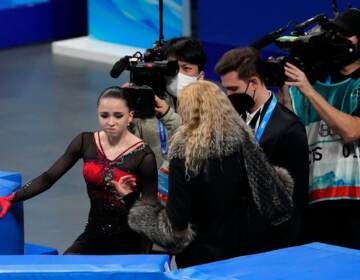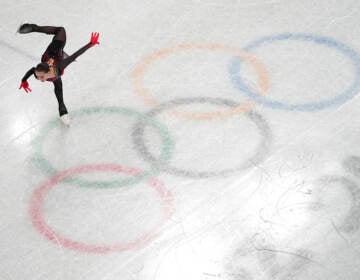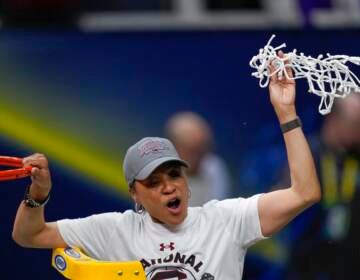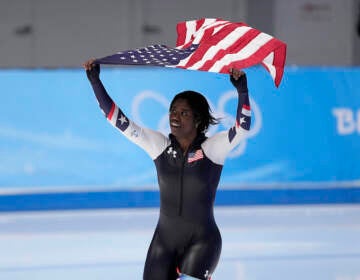Panel denies U.S. skaters’ appeal to get Olympic silver medals
Arbitrators have rejected a last-ditch request by American figure skaters to have their silver medals awarded before the end of the Olympics.
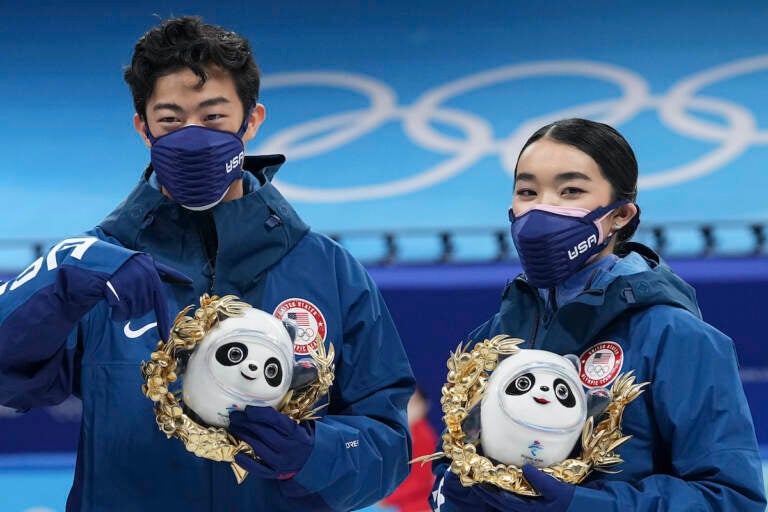
Silver medalists Karen Chen and Nathan Chen pose for a photo after the team event in the figure skating competition at the 2022 Winter Olympics, Monday, Feb. 7, 2022, in Beijing. (AP Photo/David J. Phillip)
Arbitrators have rejected a last-ditch request by American figure skaters to have their silver medals awarded before the end of the Olympics.
The Court of Arbitration for Sport said early Sunday in Beijing that it dismissed the appeal by the nine skaters, who finished second in the team event that was marred by a doping positive by 15-year-old Russian Kamila Valieva.
It did not elaborate on its decision, and said it would release details in upcoming days.
In an earlier decision, CAS had allowed Valieva to compete in the women’s event after her doping positive went public following the Russians’ victory in the team event. The International Olympic Committee responded by saying that no medals would be awarded in any event in which Valieva finished in the top three.
Losing the case means the U.S. skaters will receive their medals months, maybe even years, from now, after Valieva’s case winds its way through hearings and appeals. She led the Russians to a convincing victory in the team event. If that result is overturned, the U.S. would get gold medals.
The skaters had argued, without success, that they should at least receive the silvers before Sunday night’s closing ceremony. In a letter sent to IOC President Thomas Bach that was obtained by The Associated Press, the skaters’ attorney argued that the IOC’s “own rules mandate that a victory ceremony ‘to present medals to the athletes shall follow the conclusion of each sports event.’”
A few hours before the decision, the U.S. team of Alexa Knierim and Brandon Frazier finished sixth in the pairs event. Afterward, Frazier said “they should have a ceremony for the clean athletes that delivered. They deserve that.”
Frazier and Knierim are among the skaters who would receive medals, though neither were directly involved in the appeal as they prepared for Saturday night’s competition.
In the letter to Bach, attorney Paul Greene wrote “a dignified medal ceremony from our clients’ vantage point is one in the Medals Plaza as originally planned and afforded to all other medalists.”
Instead, the skaters could end up with Olympic torches. In a meeting with the skaters earlier this week, Bach offered the torches as keepsakes while the doping case plays out. He later said at a news conference that they were not meant to replace the medals.
Valieva might never get anything.
After her test became public, Russia’s anti-doping agency at first put her on provisional suspension, then lifted the suspension. That triggered the IOC and World Anti-Doping Agency to lead an appeal to CAS, which acted swiftly and said Valieva could still compete.
That did not resolve the larger question about the result from the team competition.
Because she is 15, Valieva is considered a “protected person” under anti-doping rules, and is not expected to receive a harsh penalty. Her coaches and doctors are being investigated by Russian and world anti-doping authorities.

Saturdays just got more interesting.
WHYY is your source for fact-based, in-depth journalism and information. As a nonprofit organization, we rely on financial support from readers like you. Please give today.


